-
A Look at the Effects of Industrial Waste
Businesses like appliance manufacturers, warehouses, and food processing facilities are some examples of producers of industrial waste near Atlanta. Although the amount of industrial waste that is produced is less than that of some other waste sources in the United States, its impact on the environment can be much higher.
Water that is discharged from factories, for example, can pollute rivers and lakes with substances like chemicals, waste, and dyes. This water pollution can kill wildlife and harm the overall ecosystem, and the effects of polluted water have left several plant and animal species endangered. Also, plastics that are disposed of improperly or sent to landfills do not break down and can pollute the environment and pose a hazard to animals.
Today, there are still many factories and facilities that do not practice responsible waste management that involves recycling and proper waste disposal. However, the environmental effects of industrial waste can be reduced when it is handled with the right techniques, and an efficient waste management plan can also help ensure a safe and clean work environment.
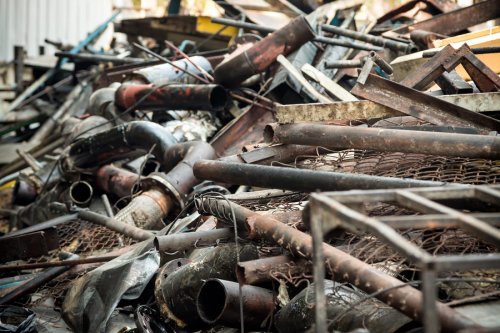
-
A Look at Industrial Solid Waste
Are you looking for ways to reduce your business’s waste near Atlanta ? If so, then you might benefit from knowing more about different types of industrial waste. Read on for information about industrial solid waste and what you can do to reduce it.
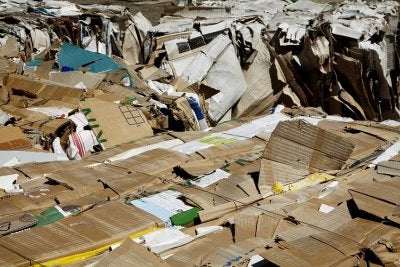
Defining Industrial Solid Waste
Industrial solid waste is that which is generated by businesses during manufacturing or industrial processes. Also, it can be produced as a separate waste source from a non-manufacturing activity. Any business, service, or commercial establishment that makes use of industrial or manufacturing processes probably produces industrial solid waste. By law, industrial solid waste is defined as a non-household and non-hazardous waste that requires evaluation to determine the proper waste disposal method.
Identifying Industrial Solid Waste
While the possibilities for industrial solid waste are nearly endless, there are some types that are commonly generated. Some of the most common examples of industrial solid waste include non-recyclable glass, oil-contaminated wastes, paint residue, tires, and electrical components. Additional examples would be food waste, animal remains and carcasses, empty chemical containers, infectious wastes, and confidential documents.
Evaluating Industrial Solid Waste
When it comes to waste management, the generator of the industrial solid waste is held responsible for evaluating the waste and proving that it is non-hazardous through methods like laboratory testing or documenting the waste’s characteristics. Warehouses, food processing facilities, automotive manufacturers, and distribution centers are some examples of sites that might produce industrial solid waste.
Reducing Industrial Solid Waste
As many business owners are glad to learn, there are several ways in which companies can decrease the amount of industrial solid waste that they reduce. First, upgrade to technology and production techniques that lessen the amount of waste created. Next, maintain your equipment and ensure that your team is properly trained. Finally, initiate an industrial waste recycling program. By reducing the amount of industrial solid waste produced by your business, you can save on waste management costs and reduce your company’s environmental impact.
-
Spotlight on Non-Ferrous Metal Recycling
All recyclable materials have their worth, but non-ferrous metals are particularly valuable. If your company produces scrap metal or if you are interested in the effects of recycling on the environment, then you can benefit from learning more about non-ferrous metal recycling near Atlanta.
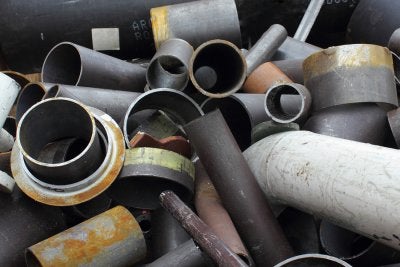
What are non-ferrous metals?
Non-ferrous metals include copper, zinc, tin, nickel, aluminum, lead, gold, silver, platinum, and others. The metals in this category do not contain iron, are non-magnetic, and are more resistant to corrosion than ferrous metals. Of all the recyclable materials, non-ferrous metals are among the few that do not break down or lose their physical or chemical properties during the recycling process, meaning that they can be reused an infinite number of times without changing in composition. These characteristics make non-ferrous metals incredibly valuable recycling materials.
What items are made from non-ferrous metals?
A large amount of the non-ferrous metal that is recycled in the United States comes from industrial waste resulting from the production of goods like cars and appliances. Some examples of industrial sources of non-ferrous scrap metal include automobile batteries, radiators, boats, window frames, airplane parts, aluminum siding, pipes, and electrical wires. As a consumer, you might find yourself recycling these metals in the form of soft drink cans, packaging materials, cookware, cutlery, batteries, tin cans, and door knobs.
How are non-ferrous metals recycled?
If referring to volume, then non-ferrous metal recycling doesn’t account for much of all recycled materials in the United States. However, in terms of scrap metal, non-ferrous metal scrap made up more than 50% of total scrap recycling industry earnings in the country in 2012. The process starts with non-ferrous metal being collected through industrial, commercial, and residential recycling systems. The metal is then transported to a metal recycling center, where it is sorted. Each variety is then processed, refined, and converted into billets and ingots which are later sold to industries to be transformed into goods and start the process once again.
-
Types of Non-Hazardous Industrial Waste
Having an effective and efficient recycling and waste disposal system is important for any business. If your company is part of an industry that produces waste, then understanding which materials are hazardous and which are not can be essential for developing a resourceful waste management program. If you regularly deal with industrial waste near Atlanta , then continue reading to learn about which materials are considered non-hazardous.
Non-hazardous industrial waste falls into several classifications. Class 1 wastes can be potentially threatening to the environment and human health, and examples of these include liquids that can ignite at temperatures exceeding 150 Fº and soils that are contaminated with petroleum hydrocarbons. Class 2 wastes are typically accepted at local landfills and can include items like non-radioactive non-surgical medical waste and depleted aerosol cans. Finally, Class 3 wastes do not decompose or react with other materials, and they are also insoluble. A few examples of Class 3 wastes are glass, rocks, bricks, and some plastics.
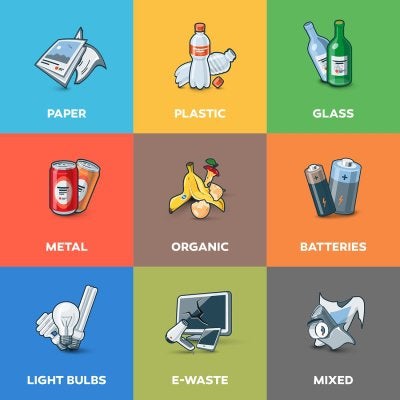
-
Dealing with Waste in a School Setting
School is essential for shaping the minds of the next generation. Like any other productive and important institution, however, schools tend to produce waste. Whether you’re trying to come up with waste management solutions for an elementary school or a university, consider working with a waste management company in Atlanta to address the following considerations.
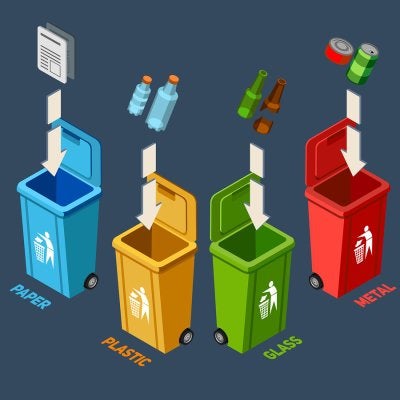
Determining Waste Generation
Before you can implement an effective waste management plan, you must first determine how much waste your school generates on average. It might be helpful to keep track of the waste from each department; that way, all the departments in your school can work together to reduce unnecessary waste.
Raising Recycling Awareness
Learning to recycle is important for preschoolers and grad students alike. You and your waste management company will find that recycling is a lot easier if the students put their waste in the right bins. As you begin a new partnership with recycling experts, consider teaching your students the basics of recycling. You might even have a designated recycler stand near the bins at lunchtime to make sure waste makes it into the appropriate places.
Setting Up a Recycling Program
Institutions that generate a considerable amount of waste can benefit from working closely with waste management companies. For example, you could ask your local recycling experts what to do with old desks or obsolete computers. Partnering with a local waste management company in Atlanta is a great way to ensure that your waste needs are met in a responsible manner.
Disposing of Delicate Paperwork
Students often need to provide schools with personal information during the admissions process. When the time comes to dispose of that information—usually years after the student has graduated—it’s the school’s responsibility to make sure it is done so in a discreet and responsible manner. Failure to do this could result in embarrassment or even identity theft.
-
Reasons to Track Your Waste
If you’re concerned about the cost of your company’s waste disposal in Atlanta , you should ask your waste management company about tracking your company’s waste. A waste analytics program allows you to determine exactly where and how you are generating the most waste, and thus paying the most for trash pickup, junk removal, and waste disposal. Tracking your company’s waste will also allow you to identify sustainable ways to reduce your waste production, reuse items when possible, and recycle items when possible.
When you know which waste items are recyclable, you can set up a recycling program through your local recycling center. Make sure that you place recycling bins throughout your building, and inform all employees of key recycling facts. The more items that you are recycling, the less will have to be hauled away for waste disposal in a landfill.
Tracking your company’s waste will also enable you to set up a more efficient trash pickup and garbage disposal schedule. You can save money on waste management and waste disposal costs by reducing the number of times you need trash pickup and junk removal each month.
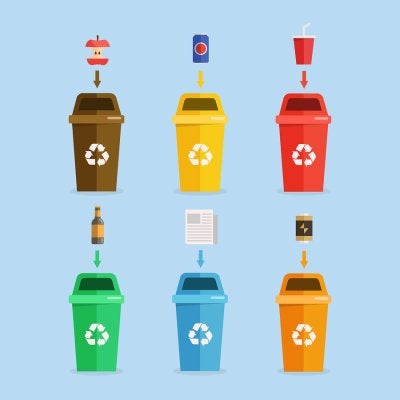
-
How to Reduce Waste at Your Office
Offices typically generate quite a bit of waste in Atlanta , from paper, plastics, and glass, to food waste and electronics waste. Your local waste management company can help you develop and implement a sustainable waste management program that allows you to reduce, reuse, and recycle throughout the office. Here are some great ways that you can reduce waste at your office.
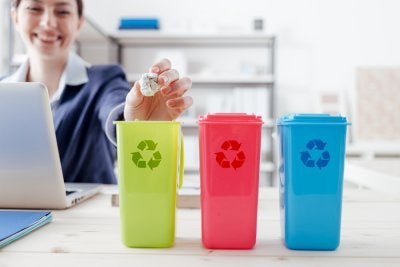
Reduce Waste Generation
You can quickly reduce the amount of waste that is generated throughout your office by reducing your reliance on paper products. Encourage employees to share information electronically, and resist printing out materials for your use or to convey information. You can also stop using cover sheets on faxes, print documents on both sides of the paper, use the copy machine less often, eliminate unnecessary forms or redesign them to use less paper, and post announcements electronically or on a central bulletin board. You can also use fewer paper products in your kitchens and bathrooms, and instead use washable, reusable products.
Reuse Valuable Materials
You can reuse valuable materials, like paper, throughout the office. Paper only has printing or writing on one side can be reused as scratch paper. File folders, internal envelopes, binders, packaging materials, and other office supplies can be shared and reused throughout the office. You can also donate items that can’t be used again within the office to other charities or organizations so that they won’t end up as waste.
Recycle and Compost When Possible
Your local recycling center can provide you with valuable recycling facts and can inform you as to which items are recyclable and compostable. Most recycling centers can process paper recycling, glass recycling, cardboard recycling, and plastic recycling. Some can also manage scrap metal recycling and electronics recycling. Do not dump or throw away any office item that can be safely recycled. Place recycling bins throughout the office, and arrange for your waste management company to pick up your recycling when they do your trash pickup. Most food waste can also be composted and used for fertilizer. Find out if your office generates food waste that is compostable, and ask your recycling center or waste management company about composting.
-
Essential Elements of Commercial Waste Management
Streamlining your commercial waste management practices can be a highly effective strategy for improving the profitability and sustainability of your business. With services from a company that specializes in waste management and recycling serving Atlanta , you will be able to determine which disposal methods will be best for your business. To ensure that your waste management provides your business with the best functionality, you will want to incorporate several essential elements.
Dumpsters, trash cans, and recycling bins are three essential commercial waste management tools. Trash cans are among the most important elements of a commercial waste management plan. Strategically placed trash cans can help you make sure that your employees and clients are throwing away their trash in the proper containers. Along with placing plenty of trash cans around your facility, you may also want to include recycling bins in your plan. At the end of the business day, a dumpster can be used to collect and house bulk amounts waste until it can be picked up.
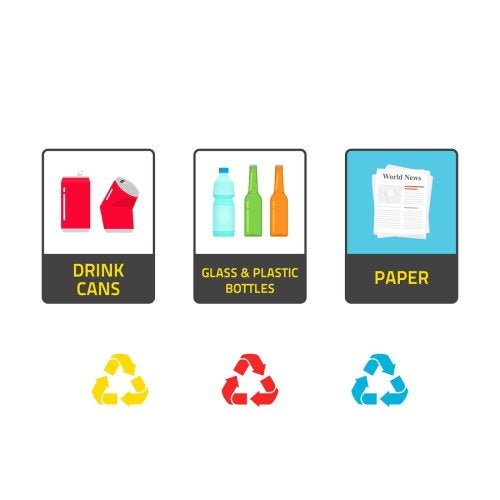
-
Examining Common Types of Manufacturing Waste
Manufacturing facilities rely on efficiency and streamlined production methods in order to create their products. However, even the most efficient manufacturing plants are bound to generate some form of waste. By working with a company offering waste management and recycling near Atlanta, you can reduce the amount of materials that you discard during the manufacturing process, while also making sure that your waste is disposed of in a safe and responsible manner. If you are creating a waste disposal plan for your manufacturing plant, read on to learn more about the most common types of manufacturing waste.
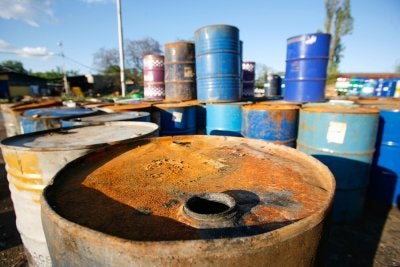
Solid Waste
Solid waste is a term that describes any paper, plastic, metal, or carbon based materials that are left over after the manufacturing process is completed. Some examples of solid waste include cardboard, scrap metals, or packaging materials. While some solid waste must be thrown in a dumpster, other forms of waste can be easily recycled. Recycling paper and cardboard can help you cut back on the carbon footprint of your manufacturing process.
Chemical Waste
Depending on the nature of the manufacturing process, certain facilities may generate large amounts of chemical waste. Unlike solid waste, which can be placed in a bin for disposal, chemical waste must be contained using special disposal methods. Many types of chemicals can cause environmental harm when they are not disposed of in a proper manner. Your waste management specialists can advise you on best chemical waste disposal practices for your business.
Toxic Waste
Toxic waste is an unavoidable byproduct of many manufacturing methods. While you may not be able to reduce the toxicity of certain kinds of waste, you can make sure that any toxic substances that are created in your plant are not allowed to contaminate the surrounding environment. Toxic waste disposal and management is regulated by governmental organizations, so you will want to make sure that your disposal plan is on par with environmental regulations for your county or state.
-
Answering Questions About Electronics Recycling
While many products and materials can be recycled, not all are processed in the same way, so it is common for people to be unsure about what they can toss into their recycling bins in Atlanta. When it comes to recycling electronics, also called e-waste, people often have plenty of questions:

Can I recycle my old electronics?
You can recycle electronics. Because it is important to dispose of electronics appropriately, rather than simply throwing them in the trash, you should always recycle your electronics. Companies that accept e-waste materials have the resources and equipment necessary to safely disassemble your discarded electronics. You can also consider selling or donating your old devices if you dislike the idea of them being broken down for parts.
Why shouldn’t I throw my electronics in the garbage?
There are a few reasons why you shouldn’t toss your old electronics away with the rest of your trash. First, they may hold personal information that could put your identity at risk. Second, many e-waste materials contain toxic substances, such as mercury, lead, and cadmium, which require particular waste disposal methods to be handled safely. When sent to the landfill, electronics can leak these toxins, which may harm local wildlife or contaminate food and water sources.
Can I put my old electronics in blue recycling bins?
The answer to this question depends on the particular recycling program in which you participate. Contact your recycling service provider to learn more about what can and can’t go in your blue bin. Some companies accept everything from circuit boards and cell phones to flat screens and fax machines.
What is the easiest way to properly dispose of electronics?
If your recycling service does not accept e-waste, contact your local electronics store instead. Most major electronics manufacturers and retailers offer in-store and event recycling programs, and some will even haul away your old televisions and computers. You can refer to the EPA’s website for more information about companies that participate in the Sustainable Materials Management program.
RECENT POSTS
categories
- Uncategorized
- Waste Management Atlanta
- Waste Disposal and Recycling
- Hazardous Waste Disposal
- Chemical waste removal
- solid waste removal
- R3 Program
- Sustainable Organizations
- Sustainable Waste Removal
- Commercial Waste Removal
- Materials Management Program
- Dumpster Rental
- Roll Off Dumpsters
- Construction Site Waste Removal
- Sustainability
- Recycling in Atlanta
- Industrial Recycling
- Industrial Waste Removal Services
- Southern Waste & Recycling
- Waste Removal Atlanta
- Waste Specialists
- Atlanta
- Infographic
- Front Load Dumpsters
- Rear Load Dumpsters
- Reusable Electronics
- Dump Truck Atlanta
- Recyclable Electronics
- Trash Compactors
- Recycling
- Recycling Program
- Office Recycling
- Metal Recycle
- Electronic Waste
